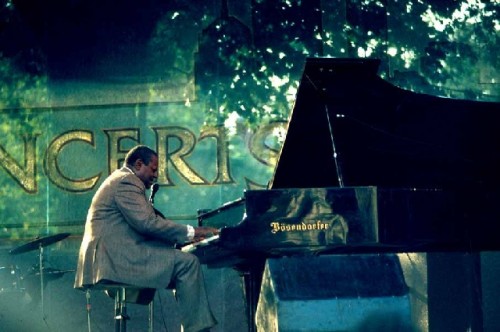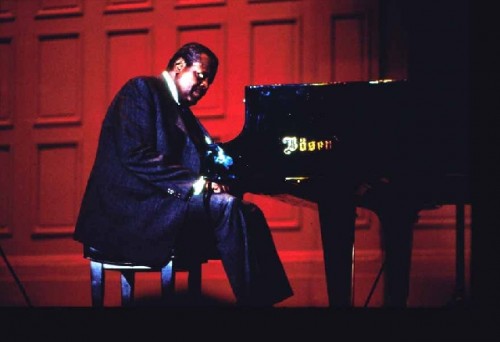Jazz Pianist Oscar Peterson: 1925- 2007
Duke Ellington Dubbed Him the Maharajah of the Keyboard
By: Charles Giuliano - Dec 25, 2007
A very large man, I will remember Oscar Peterson in profile seated at a grand piano. There was an enormous physical presence but a tasteful, elegantly subdued demeanor as he evoked a swinging, lyrical style with subtle improvisations and a great respect for melody. One always was vividly aware of the standards that he played with swift, legato flourishes and superb craft.
The music of Peterson belongs to a tradition of refined, romantic, and cerebral jazz. There was little indication of the grit and adversity we associate with the blues. His playing seemed to soar above whatever tribulations he encountered growing up in the tough, dominantly black neighborhood of Little Burgundy in Montreal. He represented an approach to jazz that elevated it as an art form. It is the kind of playing that evokes the term Black Classical Music and Peterson was one of its signature exemplars.
There is a dichotomy in the jazz tradition with one branch deeply rooted in the blues as an expression of African American struggle, triumph and torment. Or, as Duke Ellington stated "It don't mean a thing if it ain't got that swing." It is a music that is primal and gut wrenching and likely to evoke sobs of anguish or joy if it reaches you at the appropriate time. In moments of grieving, or lost love, jazz has the power to tear your heart and soul apart then patch it back together.
There is another branch of the music that strives for the highest form of aesthetic achievement while retaining its form and source. The dichotomy is perhaps best expressed in the contrast between the tortured, fractured, broken, late work of Billie Holiday when her music expressed the shards of a lost life. On the other hand, consider the acrobatic riffs of Ella Fitzgerald who had the greatest chops of any jazz singer. Ella could sing circles around a tune, stretch and pull it with the flips and twists of an Olympics gymnast. But Ella rarely reached our inner being with the devastating insight of Billie, Lady Day, who bared her heart and soul.
Only a handful of the greatest musicians were able to create a confluence of those tendencies, on the one hand magnificent musicianship and chops, with down and dirty, gut bucket blues. Two who come immediately to mind would be the greatest of all jazz masters Miles Davis and Charlie Parker. Ray Charles would be another or Betty Carter. Aretha Franklin and Otis Redding in their prime. Marvin Gaye. Dizzy Gillespie during the Bop era. And, of course, Charlie Mingus, Sonny Rollins and Thelonious Monk.
Today, there is far too much tasteful jazz. It has become so academic and uptown. In my 7,500 album collection there is not a single example by Wynton Marsalis. Everything about his playing and persona just seems so trite, academic and pretentious. It is what I used to feel about Keith Jarrett and Dave Brubeck (except "Take Five" with Paul Desmond). But I was among the handful of fans of the pianist Lennie Tristano especially with Lee Konitz. A group of us used to drive from Boston to attend his annual gigs at the Half Note at the corner of Hudson and Spring Streets in New York. Now that was jazz at its far out, ultimate best. Like gone man, gone. We grooved on the big bands of Stan Kenton and Woody Herman, jazz at its most experimental, or Duke Ellington at his most ambitious.
As a soloist Peterson rarely penetrated me beyond an appreciation of his superb chops. He was often compared to Art Tatum but Peterson never achieved that level. Tatum was far and away the greatest pure musician who ever touched the keyboard. If Peterson was the Maharajah then Tatum was the Taj Mahal. But while Tatum could spin your head trying to keep up with his lightning fast, driving attack, it appealed more to the mind than the soul. For that one turned to Bud Powell, the greatest of the Bop pianists, or to the soft, understated, smoldering intensity of Bill Evans. His "Waltz for Debbie" is on the shortest list of greatest jazz masterpieces.
But combine Peterson with other musicians and he was an amazing accompanist who had the ability to bring out the best in other players. Fortunately, as a part of his legacy, this is precisely what jazz impresario and producer, Norman Granz, saw in him. Peterson was often a part of the mix on the numerous and quite odd combinations of jam sessions assembled by Granz. Some of the greatest and most confounding of all recordings are the Jazz at the Philharmonic series (Verve Records). Granz often seemed more interested in filling concert halls by booking celebrities than a sensitivity as to how their talent and disparate approaches would mesh. Often the musicians cut and riffed with an emphasis on their differences. In that mish mash of sound Peterson was the glue, with his long term bassist Ray Brown, that held those sessions together.
Long after the prime of jazz, Granz founded Pablo Records. He often brought together odd combinations of musicians in the studio. Peterson was more or less his house pianist although a number of sessions featured the every minimalist and funky Count Basie. Peterson was never better than when he was paired with Ella Fitzgerald. Their lyrical, improvisational styles were perfectly suited. Although no singer ever sounded better than when they fronted the Basie Band. Or Ella's musical love affair sessions with Louis Armstrong.
One of my most interesting experiences with Oscar Peterson, over the many occasions when I heard him perform in concerts and festivals, was the time that he didn't show up. It was a gig at Symphony Hall and a blizzard grounded him. But guitarist Joe Pass managed to reach Boston. There was a small turnout of folks who braved miserable weather. Tickets were refunded and we were treated to a free solo performance of Joe Pass (1929-1994). Before that evening I knew little about him. He wasn't particularly charismatic as he spoke with the audience and thanked us for coming. But man he could play. That performance still lives with me. Later Pass became the house guitarist for Pablo Records with Peterson and in other combinations.
So, on Christmas Day, a time of celebration, we pause and note the passing of yet another giant of the music. How about an Oscar for Peterson?



